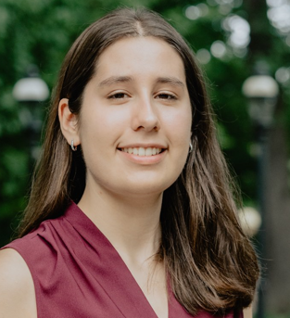To Isabella Federico ’24, the path of an engineer isn’t necessarily clear-cut, but the end goal is certain.
“You’re applying everything that you discover in science or technology to human causes,” she says. “Engineers integrate different fields of interest into something that leads towards benefiting humanity.”
Federico got an early introduction to the wide-ranging discipline while attending a STEM-focused high school in central New Jersey. Her experiences opened her eyes to the scope of engineering and its impact on the world—and sparked her interest in pursuing bioengineering research in college.
“Lehigh was one of my primary choices because not only is the tradition behind engineering so strong here, but I felt that I could get into research pretty early and have a good framework for networking with alumni,” says Federico, who is a bioengineering major and a Clare Boothe Luce Research Scholar.
The Clare Boothe Luce (CBL) Research Scholarship enables high-achieving undergraduate women in engineering to conduct research, with faculty guidance and mentoring, during the academic year as well as over the summer. The program, which is funded by a grant from the Henry Luce Foundation, provides financial support for up to two years. At Lehigh, CBL scholars also take part in community outreach, serving as mentors in the Rossin College's CHOICES camp, and present their work at the college's David and Lorraine Freed Undergraduate Research Symposium.
During her time at Lehigh as an undergraduate researcher and a CBL scholar, Federico has worked on projects in two different labs.
In the TGF Lab, led by Tomas Gonzalez-Fernandez, an assistant professor of bioengineering, Federico gained experience in the basics of cell culture while learning more about applications of the CRISPR/Cas9 gene-editing system to improve musculoskeletal tissue regeneration. Her interest in the Nobel-Prize-winning technology stems from a project she did in high school on its use in the development of treatments for cystic fibrosis symptoms.
Federico is currently working under the guidance of Sabrina Jedlicka, an associate professor of bioengineering and materials science and engineering and Lehigh’s deputy provost for graduate education. In the Jedlicka Lab, Federico is collaborating with a PhD student on a project using single-walled carbon nanotubes, or cylindrical molecules composed of many carbon atoms, to induce neuronal differentiation, a process where neurons become specialized.
In this work, Federico grows neural stem cells—a process requiring optimal, sterile conditions. Lehigh’s resources provide the complex materials necessary for this meticulous process.
Before graduating, she hopes to get more hands-on experience with nanotechnology, as she envisions a possible career related to cell and gene therapy, she says. This past summer, she explored the area as a cell therapy process development intern at Precision BioSciences, in Durham, NC.
While she’s considering her next steps as an engineer post-graduation, Federico says the opportunity to be mentored by professors and PhD students has been worthwhile.
“Being able to learn from them and benefit from their knowledge and experience,” she says, “is one of the best parts of being involved with research.”
—Story by Brooke Bisceglia ’23


